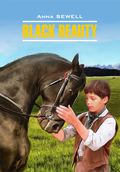
Анна Сьюэлл
Black Beauty, Young Folks' Edition
CHAPTER XII
A LONDON CAB HORSE
My new master's name was Jeremiah Barker, but as every one called him Jerry, I shall do the same. Polly, his wife, was just as good a match as a man could have. She was a plump, trim, tidy little woman, with smooth, dark hair, dark eyes, and a merry little mouth. The boy was nearly twelve years old, a tall, frank, good-tempered lad; and little Dorothy (Dolly they called her) was her mother over again, at eight years old. They were all wonderfully fond of each other; I never knew such a happy, merry family before or since. Jerry had a cab of his own, and two horses, which he drove and attended to himself. His other horse was a tall, white, rather large-boned animal, called Captain. He was old now, but when he was young he must have been splendid; he had still a proud way of holding his head and arching his neck; in fact, he was a high-bred, fine-mannered, noble old horse, every inch of him. He told me that in his early youth he went to the Crimean War; he belonged to an officer in the cavalry, and used to lead the regiment.
The next morning, when I was well-groomed, Polly and Dolly came into the yard to see me and make friends. Harry had been helping his father since the early morning, and had stated his opinion that I should turn out "a regular brick." Polly brought me a slice of apple, and Dolly a piece of bread, and made as much of me as if I had been the Black Beauty of olden time. It was a great treat to be petted again and talked to in a gentle voice, and I let them see as well as I could that I wished to be friendly. Polly thought I was very handsome, and a great deal too good for a cab, if it was not for the broken knees.¸
"Of course there's no one to tell us whose fault that was," said Jerry, "and as long as I don't know I shall give him the benefit of the doubt; for a firmer, neater stepper I never rode. We'll call him Jack, after the old one—shall we, Polly?"
"Do," she said, "for I like to keep a good name going."
Captain went out in the cab all the morning. Harry came in after school to feed me and give me water. In the afternoon I was put into the cab. Jerry took as much pains to see if the collar and bridle fitted comfortably as if he had been John Manly over again. There was no check-rein, no curb, nothing but a plain ring snaffle. What a blessing that was!
After driving through the side-street we came to the large cabstand where Jerry had said "Good-night." On one side of this wide ¸street were high houses with wonderful shop fronts, and on the other was an old church and churchyard, surrounded by iron palisades. Alongside these iron rails a number of cabs were drawn up, waiting for passengers; bits of hay were lying about on the ground; some of the men were standing together talking; some were sitting on their boxes reading the newspaper; and one or two were feeding their horses with bits of hay, and giving them a drink of water. We pulled up in the rank at the back of the last cab. Two or three men came round and began to look at me and pass their remarks.
"Very good for a funeral," said one.
"Too smart-looking," said another, shaking his head in a very wise way; "you'll find out something wrong one of these fine mornings, or my name isn't Jones."
"Well," said Jerry pleasantly, "I suppose I need not find it out till it find me out, eh? And if so, I'll keep up my spirits a little longer."
Then there came up a broad-faced man, dressed in a great gray coat with great gray capes and great white buttons, a gray hat, and a blue comforter loosely tied around his neck; his hair was gray, too; but he was a jolly-looking fellow, and the other men made way for him. He looked me all over, as if he had been going to buy me; and then straightening himself up with a grunt, he said, "He's the right sort for you, Jerry; I don't care what you gave for him, he'll be worth it." Thus my character was established on the stand. This man's name was Grant, but he was called "Gray Grant," or "Governor Grant." He had been the longest on that stand of any of the men, and he took it upon himself to settle matters and stop disputes.
The first week of my life as a cab horse was very trying. I had never been used to London, and the noise, the hurry, the crowds of horses, carts, and carriages, that I had to make my way through, made me feel anxious and harassed; but I soon found that I could ¸perfectly trust my driver, and then I made myself easy, and got used to it.
Jerry was as good a driver as I had ever known; and what was better, he took as much thought for his horses as he did for himself. He soon found out that I was willing to work and do my best; and he never laid the whip on me, unless it was gently drawing the end of it over my back, when I was to go on; but generally I knew this quite well by the way in which he took up the reins; and I believe his whip was more frequently stuck up by his side than in his hand.
In a short time I and my master understood each other, as well as horse and man can do. In the stable, too, he did all that he could ¸for our comfort. The stalls were the old-fashioned style, too much on the slope; but he had two movable bars fixed across the back of our stalls, so that at night, when we were resting, he just took off our halters and put up the bars, and thus we could turn about and stand whichever way we pleased, which is a great comfort.
Jerry kept us very clean, and gave us as much change of food as he could, and always plenty of it; and not only that, but he always gave us plenty of clean fresh water, which he allowed to stand by us both night and day, except of course when we came in warm. Some people say that a horse ought not to drink all he likes; but I know if we are allowed to drink when we want it we drink only a little at a time, and it does us a great deal more good than swallowing down half a bucketful at a time because we have been left without till we are thirsty and miserable. Some grooms will go home to their beer and leave us for hours with our dry hay and oats and nothing to moisten them; then of course we gulp down too much at once, which helps to spoil our breathing and sometimes chills our stomachs. But the best thing that we had here was our Sundays for rest! we worked so hard in the week, that I do not think we could have kept up to it, but for that day; besides, we had then time to enjoy each other's company.
CHAPTER XIII
DOLLY AND A REAL GENTLEMAN
The winter came in early, with a great deal of cold and wet. There was snow, or sleet, or rain, almost every day for weeks, changing only for keen driving winds or sharp frosts. The horses all felt it very much. When it is a dry cold, a couple of good thick rugs will keep the warmth in us; but when it is soaking rain, they soon get wet through and are no good. Some of the drivers had a waterproof cover to throw over, which was a fine thing; but some of the men were so poor that they could not protect either themselves or their horses, and many of them suffered very much that winter. When we horses had worked half the day we went to our dry stables, and could rest; while they had to sit on their boxes, sometimes staying out as late as one or two o'clock in the morning, if they had a party to wait for.
When the streets were slippery with frost or snow, that was the worst of all for us horses; one mile of such traveling with a weight to draw, and no firm footing, would take more out of us than four on a good road; every nerve and muscle of our bodies is on the strain to keep our balance; and, added to this, the fear of falling is more exhausting than anything else. If the roads are very bad, indeed, our shoes are roughed, but that makes us feel nervous at first.
One cold windy day, Dolly brought Jerry a basin of something hot, and was standing by him while he ate it. He had scarcely begun, when a gentleman, walking toward us very fast, held up his umbrella. Jerry touched his hat in return, gave the basin to Dolly, and was taking off my cloth, when the gentleman, hastening up, cried out, "No, no, finish your soup, my friend; I have not much time to spare, but I can wait till you have done, and set your little girl safe on the pavement."
So saying, he seated himself in the cab. Jerry thanked him kindly, and came back to Dolly. "There, Dolly, that's a gentleman; that's a real gentleman, Dolly; he has got time and thought for the comfort of a poor cabman and a little girl."
Jerry finished his soup, set the child across, and then took his orders to drive to Clapham Rise. Several times after that, the same gentleman took our cab. I think he was very fond of dogs and horses, for whenever we took him to his own door, two or three dogs ¸would come bounding out to meet him. Sometimes he came round and patted me saying in his quiet, pleasant way: "This horse has got a good master, and he deserves it." It was a very rare thing for any one to notice the horse that had been working for him. I have known ladies to do it now and then, and this gentleman, and one or two others have given me a pat and a kind word; but ninety-nine out of a hundred would as soon think of patting the steam engine that drew the train.
One day, he and another gentleman took our cab; they stopped at a shop in R– Street, and while his friend went in, he stood at the door. A little ahead of us on the other side of the street, a cart with two very fine horses was standing before some wine vaults; the carter was not with them, and I cannot tell how long they had been standing, but they seemed to think they had waited long enough, and began to move off. Before they had gone, many paces, the carter came running out and caught them. He seemed furious at their having moved, and with whip and rein punished them brutally, even beating them about the head. Our gentleman saw it all, and stepping quickly across the street, said in a decided voice: "If you don't stop that directly, I'll have you arrested for leaving your horses, and for brutal conduct."
The man, who had clearly been drinking, poured forth some abusive language, but he left off knocking the horses about, and taking the reins, got into his cart; meantime our friend had quietly taken a notebook from his pocket, and looking at the name and address painted on the cart, he wrote something down.
"What do you want with that?" growled the carter, as he cracked his whip and was moving on. A nod and a grim smile was the only answer he got.
On returning to the cab, our friend was joined by his companion, who said laughing, "I should have thought, Wright, you had enough business of your own to look after, without troubling yourself about other people's horses and servants."
Our friend stood still for a moment, and throwing his head a little back, "Do you know why this world is as bad as it is?"
"No," said the other.
"Then I'll tell you. It is because people think only about their own business, and won't trouble themselves to stand up for the oppressed, nor bring the wrong-doer to light. I never see a wicked ¸thing like this without doing what I can, and many a master has thanked me for letting him know how his horses have been used."
"I wish there were more gentlemen like you, sir," said Jerry, "for they are wanted badly enough in this city."




